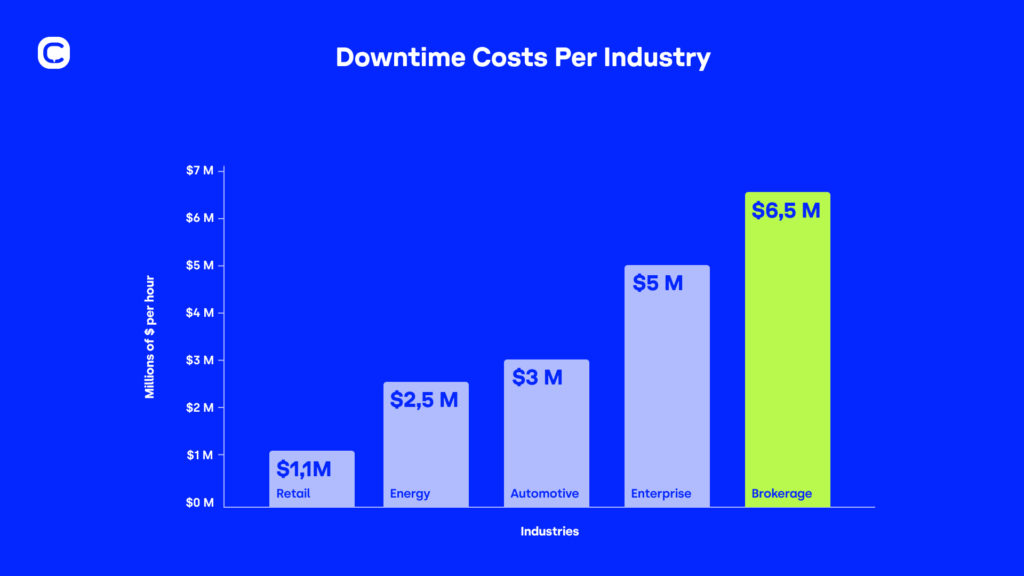Cloud IVR: What It Is & Why It’s Better Than the On-Premises Alternative

Scalability, flexibility, reliability, and cost-efficiency are the gold standard for modern software. You can achieve all of these with on-premises solutions, but it’s not easy. It often costs a lot of money, both upfront and for maintenance and upgrades.
So, what’s the alternative? Cloud-based solutions. 70% of businesses already have more than half of their software infrastructure in the cloud, and according to global IT decision-makers, as many as 95% of all workloads will be in the cloud in the next five years.
Cloud IVR, for instance, is a cost-efficient, agile, and easy to scale communications solution that—if you choose the right provider—comes with uptime guarantees to ensure reliability. And that’s only the start of cloud IVR’s advantages.
Let’s take a look at why cloud services are so appealing, and how cloud-based IVR beats its on-premises alternatives.
Key Takeaways:
- Cloud IVR is Interactive Voice Response software hosted in the cloud.
- Cloud-hosted solutions let businesses access sophisticated software features for a low monthly subscription; for example CloudTalk’s most affordable plan is just $25 per user, per month.
- IVR in the cloud is more cost-effective, reliable, and scalable than on-premises alternatives.
- The right cloud IVR solutions can help your business cut operational costs by helping you provide self-service options, allow staff to work remotely, and more.
What Is Cloud IVR?
IVR stands for Interactive Voice Response. With an IVR system, customers engage with pre-recorded prompts to help quickly determine their needs and speed them through to the right person or department.
IVR cloud services are hosted in, and operate from, the cloud. They’re not reliant on physical hardware at your business premises. Instead, you access the software hosted by your provider via an internet connection.
Cloud IVR software is generally provided on a SaaS (Software as a Service) basis, and businesses can customize the system to their needs. They don’t, however, have to worry about hosting, updating, or maintaining infrastructure.
Download our eBook, find yours, and grow your business!
Cloud IVR vs On-Premises IVR
For larger companies with plenty of space and a skilled IT department, an on-premises IVR solution can provide greater control. For companies that want to get premium features and a better return on investment (ROI) for lower initial expenditure, a cloud solution is probably a better fit.
Let’s take a look at how cloud IVR and on-premises solutions stack up against one another:
Cloud IVR
On-Premises IVR
COSTS
Cost-effective. No hardware costs, and you pay for what you use.
Server installation and maintenance can be expensive. All security and update costs fall on your company.
SCALABILITY
Easily scalable by simply adding more users and/or upgrading your package.
Requires expensive and time-consuming updates to scale.
TECHNOLOGY
Sophisticated technological features hosted on powerful cloud servers. Cloud-based technology and services are frequently updated.
Can be technologically sophisticated, depending on the scope, resources, and abilities of the company.
SECURITY
Security handled by the host company.
Security must be handled by the company itself. This creates extra work, but also gives the company greater control.
Benefits of Cloud IVR In All Areas of Your Business
Let’s delve a little deeper into the potential benefits of a cloud-based IVR solution:
1 Get More Advanced Features
A subscription-based cloud IVR solution can give you access to seriously advanced features at accessible costs.
While it’s not impossible to get these sophisticated features with an on-premises solution, it is typically more expensive and requires a lot more time and effort to achieve.
With a cloud IVR, you can easily get features like AI-powered conversation intelligence, customizable call flows, advanced data analytics, seamless CRM integration, and more.
It’s simple and cost-effective to acquire these features, and you can easily add more when you need them by upgrading your package.
It’s also worth noting that cloud-based services tend to add features faster and more frequently than on-premises engineers could. Cloud-based companies can devote their entire time and resources to keeping their operation at the cutting edge, which means they tend to have the most sophisticated and up-to-date features available.
2 Cut Operational Costs
A good on-premises IVR solution can be expensive. Very expensive. Estimates put even the most basic on-premises IVR setup at several thousand dollars in upfront costs, quickly rising into the tens and hundreds of thousands as you add features.
And that’s without factoring in the overheads an on-premises server takes to run, and ongoing maintenance costs.
By contrast, a cloud solution lets you access the most sophisticated IVR technology for as little as $16 per user, per month. For all but the very biggest companies, this is far more cost-efficient and gives a lot more ROI than an on-premises solution.
Take a look at our IVR pricing guide to get a clear idea of IVR costs and how different providers compare.
3 Allow Staff to Work Remotely
Remote working is the future. Surveys and studies reveal that remote and hybrid workers find it easier to focus, are more productive, and have a better work-life balance than on-site workers. This makes remote work incredibly appealing for employers and employees alike.
In the past, when contact center operations were limited to the on-premises model, remote work for call center agents wasn’t possible. That’s not the case with cloud IVR and other cloud-hosted software.
With a cloud-based IVR system, your agents can work from virtually anywhere in the world with an internet connection. Tools for remote teams enable collaboration over huge distances, and keep usability and security at a maximum.
Call and contact center staff no longer have to be tied to a physical location. They can access calling solutions like CloudTalk and get to work no matter where they are.
4 Scale Up and Down More Easily
Scalability is a lot more important than you might realize. Investing in software that’s hard to scale comes with a lot of hidden costs, including extra downtime and loss of revenue.
To take downtime as an example, CloudTalk data suggests that businesses can lose on average $10,000 of revenue due to downtime caused simply by switching software. Along with the other costs of downtime, the overall price companies pay quickly adds up.

With cloud IVR, this isn’t a problem. Systems like CloudTalk scale with ease as your business grows. Often, it’s as simple as upgrading your subscription. Whether you need to add a single new user or expand your business across continents, you can do it with a couple of clicks.
5 Enjoy Greater Reliability and Better Support
Downtime can be a big problem. As many as 98% of businesses say that a single hour of downtime costs over $100,000 in lost productivity. So, it’s important that your IVR system is as reliable as possible. In addition to the reliability and uptime guarantees offered by cloud IVR providers, integrating Data Security Posture Management (DSPM) can further secure your business’s data and ensure compliance with industry standards, adding an extra layer of protection to your cloud-based communications system.
If your on-premises IVR goes down, you’re in trouble. Even if you’ve got fantastic engineers, you’re still going to experience significant downtime while they fix the problem.
That’s not a problem with cloud IVR.
Cloud IVR providers like CloudTalk offer an uptime guarantee (CloudTalk’s uptime SLA is 99.99%), meaning that they devote themselves to giving a reliable service. They have engineers on hand 24/7 to monitor the system and keep things working as they should. They also have backups which kick in in the unlikely event that something goes wrong.
And, if you have an issue with your software or subscription, you can quickly and easily get through to experienced staff who will be able to help you.
Enjoy Scalability, Flexibility and Reliability With Cloud IVR
Cloud IVR is more easily customizable and scalable than on-premises alternatives, yet still matches those older systems in terms of reliability and security. And it does it all for the low cost of a monthly subscription.
For access to unparalleled IVR technology that will grow with your business, get in touch today or start a free trial.
Cloud IVR FAQs
What’s the Difference Between Hosted and Cloud IVR?
A hosted IVR is an IVR solution that’s hosted by a third-party provider. That may be in the cloud—as with cloud IVR—but could also rely on physical hardware (servers) on their premises.
Cloud IVR, on the other hand, exists entirely within the cloud. It’s a completely virtual solution, operating through the use of technology such as Voice over Internet Protocol (VoIP).
Because it’s not reliant on physical hardware, it’s often a lot more reliable than hosted or on-premises IVR solutions. It’s also easily accessible from anywhere in the world.
Does IVR Use AI?
AI is often used in IVR systems to make them more personalized, intuitive, and effective. For example, conversation AI may be deployed to pick up on context clues in customer speech, intuit the customer’s needs, and route them quickly to the right person or service.
CloudTalk uses AI to enhance customers’ experiences, to support teams, and to help contact center agents perform at their very best.
What Is an IVR Call Flow?
An IVR call flow is a route down which customer calls are directed. A good IVR system will use a series of menus. The IVR will talk each incoming caller through a number of options, and route their call through the flow according to their answers.
With CloudTalk, you can design your own intuitive, personalized call flows to help your customers reach the right person, service, or department as quickly as possible. A well-designed call flow combined with a sophisticated AI-powered IVR will help your customers to get the best possible call center experience.
Which Other Technologies Does Cloud IVR Work With?
Cloud IVR works best when combined with other call and contact center technologies. Specifically, automatic call distribution (ACD), conversation AI, and intelligent call routing can be instrumental—along with IVR—in streamlining customer journeys.
CloudTalk’s solution features all those technologies and integrates with business tools like Zendesk, Salesforce, and more. This allows you to draw analytics from every part of your business and pour all that knowledge and insight into your communications.
What is the difference between inbound and outbound IVR?
Inbound IVR handles incoming calls, guiding callers to the correct department or service, while outbound IVR initiates automated calls to customers for reminders, notifications, or surveys. Learn more about the difference between inbound vs. outbound IVR to choose the best approach for your business needs.
Is Conversational IVR the Same as an IVA?
It’s easy to get confused when it comes to IVR vs IVA. An IVA is an intelligent virtual assistant. It works in a contact center setting as an intelligent chatbot. IVAs use NLP to gather context and generate dynamic, human-like responses to customer queries.
Conversational IVR uses similar technologies including NLP to provide callers with human-like interactions. You can use conversational IVR for call routing or as a self-service option for inbound contact centers.
























